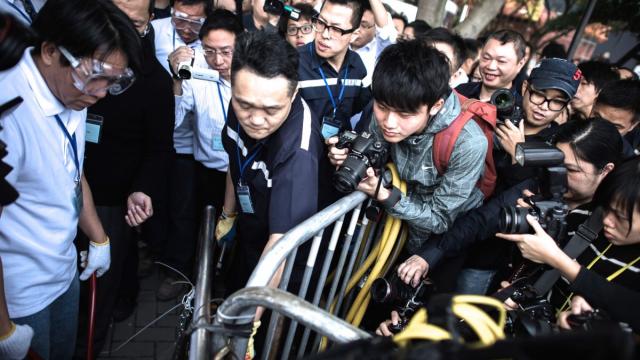
Authorities in Hong Kong began clearing a strip of the main pro-democracy protest zone on Tuesday morning, more than 50 days after it was first occupied.
Protestors offered no resistance as bailiffs oversaw a team tearing down barricades at Admiralty, with several pre-emptively removing their belongings from the area and some moving barricades themselves, possibly for use elsewhere. But some said they might take up position elsewhere in the city if forced to leave.
The court order covers only access to the Citic building at Admiralty, including two minor roads. It does not extend to the highway still being occupied by demonstrators.
It was requested by the building’s owners Golden Investment, a joint venture controlled by the Chinese state-owned Citic Group.
It is not clear how quickly authorities hope to clear the wider area and secondary protest zones in the city, at Mongkok and Causeway Bay. Taxi and minibus owners have won a court order for the clearance of the Mongkok site and bus companies have lodged applications for the main road in Admiralty to be cleared.
The police announced late on Monday that they were ready to move in to support the bailiffs in the morning. They warned in their statement of “resolute action” against anyone who obstructed or “violently charge[d]” the bailiffs.
The actual work was carried out by workers hired by the building’s owners, police said.
Student leader Joshua Wong, of the Scholarism group, said: “We will proceed on the principle of peace and non-violence.
“We are not looking for an argument with the police. If they clear the road outside the car park we will accept that. If they clear other areas it will be very disappointing.”
At their peak the protests drew more than 100,000 people to the streets of Admiralty, but the numbers have fallen to the hundreds and public support has dwindled.
Alex Chow, secretary general of the Hong Kong Students Federation, suggested in a radio interview on Monday that protesters needed to consider new actions because the impact of occupying streets had had been limited.
Asked whether he feared demonstrators would simply occupy another spot, the city’s chief executive, Leung Chun-ying, told reporters on Tuesday: “I think it is abundantly clear by now that the occupiers are and have been breaching the law of Hong Kong. Hong Kong is a law-abiding society and the rest of Hong Kong expect the occupiers, like everyone else in Hong Kong, to follow the law.
“The demand on the part of the occupiers when it comes to the constitutional development, especially universal suffrage to elect the chief executive in 2017, is also very clear, so I don’t see any point in resisting the court order.”
Protesters have demanded the resignation of Leung and the introduction of civic nominations for elections of the next chief executive in 2017. Beijing says that introducing universal suffrage for the contest would mark a major step forward but critics say nominations will be so tightly controlled that voters will have no meaningful choice.
They are also concerned about broader attempts to rein in the greater freedoms Hong Kong has enjoyed under the “one country, two systems” framework introduced when the former British colony was handed back in 1997.
3 WAYS TO SHOW YOUR SUPPORT
- Log in to post comments











